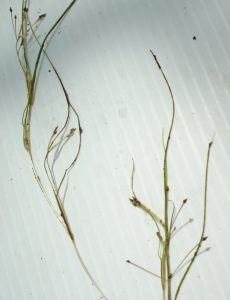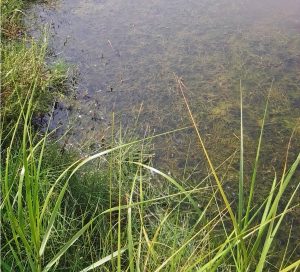Study Shows Oiling Has Multiple Subtle Negative Effects on Submerged Vegetation
– MARCH 29, 2016
Scientists conducted experiments to assess oil exposure effects on Ruppa maritima, a common underwater plant species in Gulf of Mexico estuaries.
They observed that plant roots in oiled sediment did not grow as deeply and were uprooted more easily compared to control plots. Oil-exposed Ruppia flowered less, reducing its ability to reproduce, although plant height and growth remained the same. The observed changes in soil cohesion for oiled sediment and the resultant easier uprooting of this foundation species may contribute to increased erosion during storms. They published their findings in the journal PLOS One: Effects of oil-contaminated sediments on submerged vegetation: An experimental assessment of Ruppia maritima.
Underwater plant habitats provide refuge and forage for many important commercial fin and shellfish, forage for migratory birds, buffer coastlines from erosion, and improve water quality. Previous studies have quantified the response of several marsh vegetation species to oil, but oil’s impact on submerged plants remains uncertain. Scientists at Louisiana State University exposed greenhouse-grown Ruppia plants to four oiled sediment conditions (from no to high oil levels) and analyzed growth, reproductive activity, root characteristics, the force required to uproot plants, and soil cohesion.
Ruppia plants grew in all oil concentrations, but their reproductive output differed significantly across oiling treatments. There were significant reductions in flower clusters and fruiting bodies at higher oil concentrations – factors that could translate to significant population losses over the long term. Roots grown in sediments with high oil levels were also shorter, wider, and easier to pull from the soil. The overall reduction in sediment cohesion was likely the combined result of exposure to buried oil and to the changes in the plant’s root morphology.
The team said that oil contamination may alter the trajectory of marsh ecosystem structure, function, and recovery long after initial oiling. Study author Charles Martin said, “A number of field studies have found that oiled areas erode faster than unoiled areas, but this project is the first to show this result in controlled experiments. We hope this study inspires research on other submerged plants and increases our understanding about the consequences oil exposure can have on the Gulf’s valuable natural resources.” The team recommended field studies using weathered oil to see if their results replicate in a natural setting where there can be a complex range of organisms’ response, from carbon being a nutritive source or a toxic threat.
The study’s authors are Charles W. Martin, Lauris O. Hollis, and R. Eugene Turner.
************
This research was made possible in part by a grant from the Gulf of Mexico Research Initiative (GoMRI) to the Coastal Waters Consortium (CWC).
The Gulf of Mexico Research Initiative (GoMRI) is a 10-year independent research program established to study the effect, and the potential associated impact, of hydrocarbon releases on the environment and public health, as well as to develop improved spill mitigation, oil detection, characterization and remediation technologies. An independent and academic 20-member Research Board makes the funding and research direction decisions to ensure the intellectual quality, effectiveness and academic independence of the GoMRI research. All research data, findings and publications will be made publicly available. The program was established through a $500 million financial commitment from BP. For more information, visit https://gulfresearchinitiative.org/.
© Copyright 2010- 2017 Gulf of Mexico Research Initiative (GoMRI) – All Rights Reserved. Redistribution is encouraged with acknowledgement to the Gulf of Mexico Research Initiative (GoMRI). Please credit images and/or videos as done in each article. Questions? Contact web-content editor Nilde “Maggie” Dannreuther, Northern Gulf Institute, Mississippi State University (maggied@ngi.msstate.edu).







